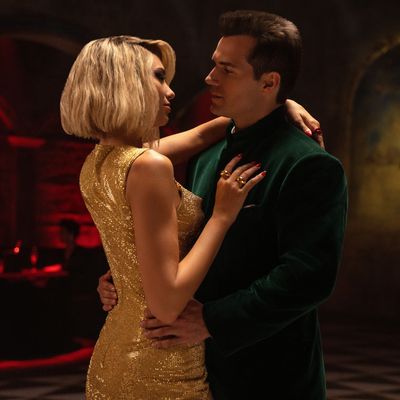
We can sense director Matthew Vaughn straining to free himself of the bonds of his chosen genre throughout Argylle. He shifts realities; he switches characters into other characters and back again; he throws every twist he can at us, then tosses extra twists within those twists; and he stages several action sequences in ways that defy not just the laws of physics and character dynamics but also the laws of what some might consider good taste. In the end, he manages to give us a messy and overcooked spy story with some of the more creative action sequences in recent memory.
It would be hard to explain the film’s story without revealing some of its many revelations, even if those revelations are largely lifted wholesale from other (generally better) movies — everything from The Last Action Hero to The Game to The Bourne Identity to Basic Instinct to The Matrix, with a bit of Knight and Day and The Manchurian Candidate thrown in. The picture opens with some colorfully silly Bondian derring-do featuring the strapping Henry Cavill as Agent Argylle, a stone-faced superspy with a Nehru jacket and a Henry Rollins flattop, and his Hawaiian-shirt-wearing handler Wyatt, played by John Cena, fighting a sexy villainess played by Dua Lipa. These characters, we soon learn, are the creations of Elly Conway (Bryce Dallas Howard), a mild-mannered and cat-loving espionage novelist whose best-selling books have become notorious for predicting real-world situations.
One day, a scruffy chatterbox named Aidan Wilde (Sam Rockwell) sits across from Elly on a train and tells her he’s a fan. Then he reveals that he’s a real-life spy and proceeds immediately to save her from about a dozen assailants. Aidan might be scrawnier and rougher around the edges than the suave Argylle, but as Elly watches him acrobatically fight off any number of shrieking, knife-wielding killers, she imagines him turning into her fictional superagent and back again — a fun visual gag involving Rockwell constantly shape-shifting into Cavill. Elly’s creation, it seems, is bleeding into her reality, and she herself is now a target, sought by a powerful organization called the Division that’s led by the sinister Director Ritter (Bryan Cranston).
There’s initially a Pirandellian thrill to watching Elly make her way through two realities, unsure of what’s true and what’s not and wondering whether to trust the garrulous and charming Aidan as her sole guide. There are a lot more twists on deck, of course, and while none of them is particularly mind-blowing, Vaughn deploys the first couple with verve and charm. Alas, the pile-up of twists eventually starts to smell of desperation. The more turns Jason Fuchs’s script takes, the more monotonous everything feels. And because Vaughn never drops his fantastical, cartoonish style, “reality” ceases to have any true meaning within the context of the film; he keeps trying to up the stakes even as what we’re watching becomes less and less consequential.
Howard and Rockwell, luckily, are likable enough to keep the proceedings from becoming too insufferable. And then there are the action sequences, which have always been Vaughn’s strong suit. In keeping with the ludicrous tone of the film, he delivers deliriously violent scenes that break free of the boilerplate badassery we usually associate with this type of thing — from an oil-spill-skating bayonet-a-thon to a brightly colored, slow-motion smoke-grenade dance-off with gun-toting pirouettes, high-birds, hip-flips, and around-the-worlds. Whenever the characters stop talking and start slaughtering people in inventive ways, it’s hard to take your eyes off the screen. That does count for something.
The truth is that Vaughn has never been much of a storyteller, but he remains an inspired choreographer of deranged mayhem. In his best films, Kingsman: The Secret Service and Kick Ass, he took Mark Millar comics and visualized them with such brutal, gonzo panache that we couldn’t help but be invested in the characters’ fates. Here, despite all the frantic plot points (and the steady stream of cameos from actors who surely got paid well for what appears to have been one day’s worth of work, from Richard E. Grant to Samuel L. Jackson to Sofia Boutella), the story is too thin for us to care all that much. Ultimately, we’re left with a movie of violent extremes — exhausting and tedious, but occasionally enchanting.


